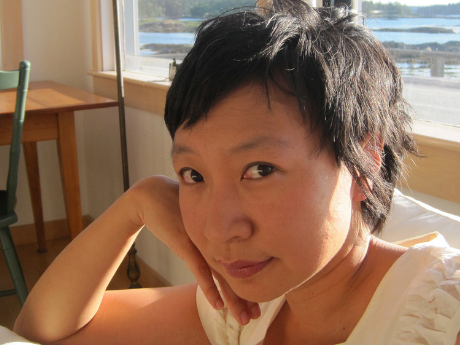New American Poets
New American Poets: Cathy Park Hong

Somehow I'm not very comfortable
Such poisonous families
I startle. Alarum, the feudal world.
I plowed the oil rig and plum blossom fields, the fields where they
danced half-ring, the
Aorta mortuary fields. The fields. If not for
The fields here, there are
Animal wanderings.
My father watched he watched
Outside the window he saw he saw
The comet streak klieg-light the setting light the world parcels off
into mindless.
Trees in essence flagrant assonance
I suck back into my mouth.
I am this chair, talking to him,
If the burden is to go back.
The world parcels off into seepage, capillary tea-bags he said, he
said I must work, I said
I had no dreams that night.
But allure the shoe-polished twilight,
Brunt flotilla of stars
This minus store amid the fields,
Amid the blight amid
The cold-ball bearing I yearn,
For you who lastly fueled breathing this air this air.
"Somehow I'm not very comfortable" by Cathy Park Hong. All rights reserved. Reprinted with the permission of the author.
I've always been inspired by American poets (Lorine Niedecker, Wallace Stevens, Michael Palmer, George Oppen, to name just a few) but there is one poet whose work I obsessively turn back to. Unfortunately, he's German. But in the great tradition of American poets looking outside their boundaries for inspiration, I would, if I may, like to stray a bit off the subject.
While I can't say any of Paul Celan's singular poems have left a thumbprint on my own, I was always inspired by the charged force of his inventions and his moral outlook that defied this tired trope that a poetic voice must unmoor itself and transcend history. While Celan saw language as innately sullied (German was "his mother tongue that was both his and his murderers"), he had the vital impulse to repair it. He coined neologisms, recombined words, wove in Hebrew and Latin, while his lines grew austere and more condensed.
It's a challenge then to pick only one poem of his since I read his work, especially his later ones, as a continual atonal score of strained incantations. But one poem I repeatedly turn to is "Stretto" (or "Straitening" "or Strette" depending on the translation you read). There are hints of his more famous poem, Death Fugue, in Stretto such as the revisiting of the executioner's "rifle range" but he sheds the 3 beat refrain of the fugue in favor of the aphasic stutter. I am most haunted by the poem's halting repetitions: "It is I, I,/I lay between you, I was/open, was/audible, ticked at you, your breathing obeyed, it is/I still, but then/you are asleep." Celan's stanzas, if you can call them that, act as word traces where subjects trail off and return as something else-- I disappears and becomes "the eye, the moist one…" and the "word" dissolves and becomes "the world."
As much as I love the stuff of words (I am more a maximalist than the minimalist Celan), I always feel a twinge of distrust for seamless verse for its gloss and prefer the variance of glossolalia. Celan's wracked ambivalence with language, how he was both fascinated by word's etymological root and yet felt the need to unremittingly uproot them from syntax, rings truer to me in facing cultural estrangement. While I can't fully unpack the meaning of "Stretto," I'm always chilled and moved by its echoing lines--"the world like a millionfaced crystal, shot out, shot out."
Now, some poets refuse to look to the present political world for fear that being too lock-step with time will taint poetry's timelessness. Or if they do, it's often done so in metaphors that are all too easily digestible or "urgent" in a predictable bold-faced way.Faced with the horrors of the Holocaust and its aftermath, Celan shed the available resources of images and prosody as relics and mined a new and necessary poetics. I'm inspired by his direction. Indeed, he invented a pressurized language that was so uniquely encoded within his own tragedy, it seems impossible to scavenge his images, the way all poets scavenge other poets' images, or use his poetry as a guiding template. He is arguably the most inimitable of poets.


